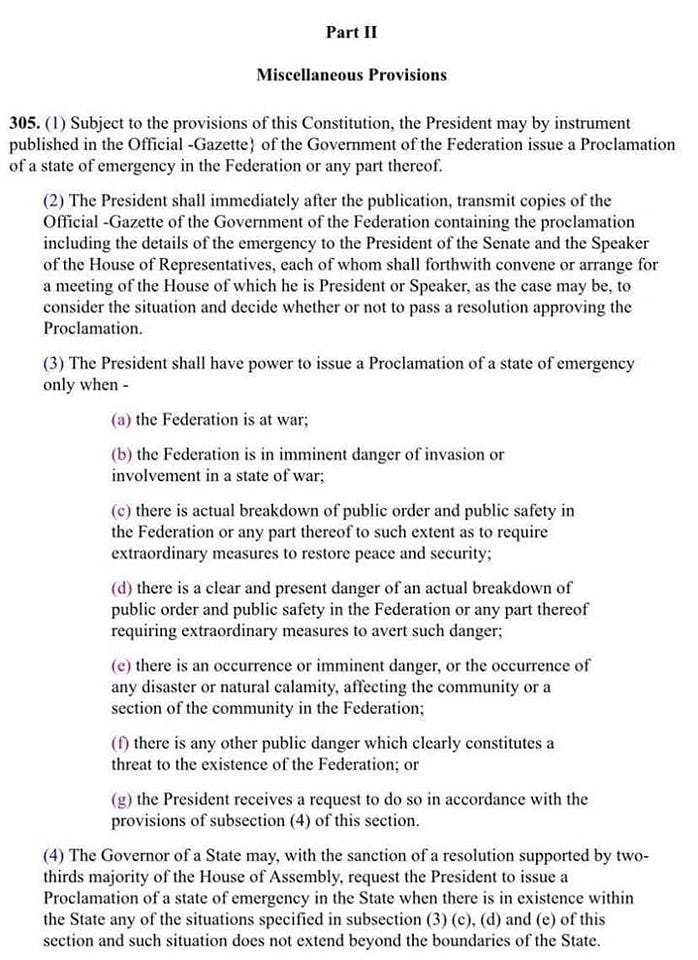Booted from Brick House
President Bola Tinubu declares six-month state of emergency in Rivers State, suspending Governor Fubara and lawmakers amid tensions.
In response to escalating tensions in Rivers State, President Bola Tinubu declared a six-month state of emergency, suspending Fubara, Odu, and all state lawmakers. The Rivers State House of Assembly, dominated by Nyesom Wike loyalists, had accused Governor Siminalayi Fubara and Deputy Governor Ngozi Odu of misconduct, including unauthorised spending and obstructing assembly functions, the second impeachment attempt since Fubara’s 2023 inauguration. Vice Admiral Ibokette Ibas has been appointed Administrator with limited legislative powers. Both the House of Representatives and the Senate have approved President Bola Tinubu’s request to declare a state of emergency in Rivers State.

The unfolding political drama in Rivers State is a stark reminder of the fragility of democratic institutions in Nigeria, particularly when personal rivalries and power struggles overshadow governance and public service. The impeachment notice issued by the Rivers State House of Assembly against Governor Fubara and Deputy Governor Odu came as the last straw in a protracted battle for control of the state’s political machinery. This conflict, rooted in the rivalry between Fubara and his predecessor, Nyesom Wike, has escalated to a point where governance appears secondary to political survival. The allegations against Fubara—unauthorised spending, unapproved appointments, and obstruction of legislative functions—are serious and warrant thorough investigation. However, the timing and context of these accusations raise questions about their legitimacy. The fact that the impeachment notice comes from a House of Assembly dominated by Wike loyalists suggests that this may be less about accountability and more about settling political scores. Such actions risk undermining public trust in democratic processes and institutions, as they appear to be driven by partisan interests rather than the welfare of the people.
The declaration of a State of Emergency (SoE) by President Tinubu adds another layer of complexity to the situation. We do not believe that the situation in Rivers State warrants applying the nuclear option that President Tinubu has chosen. Furthermore, if an SoE is declared, the Constitution does not grant the president the power to remove or suspend another elected official unilaterally. While the move is ostensibly aimed at restoring peace and order, it has sparked controversy and accusations of political overreach. The suspension of elected officials, including the governor and deputy governor, effectively sidelines the democratic mandate of Rivers State’s electorate. Though framed as a necessary intervention, this decision could be perceived as an erosion of democratic norms, especially in a country where the misuse of emergency powers has a troubling history. As we have said repeatedly, Nigerian politicians act as if they will be in power forever—without considering the implications of an opponent gaining power and disregarding the law and constitution to act against them. This holds for all involved—Tinubu, Wike, Fubara, and the Rivers State lawmakers alike.
The appointment of Vice Admiral Ibokette Ibas as Administrator and the National Assembly performing legislative functions further underscores the federal government’s direct involvement in the state’s affairs. While Ibas’s role is limited in terms of legislative authority, his presence as an unelected official overseeing the state’s governance raises concerns about the centralisation of power and the potential marginalisation of local voices. Preserving the judiciary’s independence is a positive aspect, but it does little to assuage fears about the broader implications of this intervention.
Rivers State is a cornerstone of Nigeria’s economy because it is a major hub for oil and gas production. The state hosts key oil infrastructure, including refineries and pipelines. It contributes significantly to Nigeria’s crude oil exports, which account for a substantial portion of the country’s foreign exchange earnings and government revenue. Beyond oil, Rivers State is a commercial and industrial centre, with Port Harcourt’s two seaports facilitating trade and commerce. Instability in Rivers State, therefore, has far-reaching economic implications. Political unrest or disruptions in the region can lead to oil production shutdowns, sabotage of infrastructure, or delays in exports, all of which would severely impact Nigeria’s revenue streams. Such instability could also deter foreign investment, exacerbate unemployment, and hinder economic growth in the state and across the country. The ripple effects of prolonged unrest in this critical region could further strain Nigeria’s already fragile economy.
The situation in Rivers State highlights the precarious balance between maintaining order and upholding democratic principles. While the federal government may have legitimate concerns about the state’s stability, its actions must be transparent, proportionate, and guided by the rule of law to avoid further polarising an already volatile situation. Unfortunately, the unconstitutional manner of the approval by both houses of the National Assembly—by voice vote—guarantees that transparency will be in short supply throughout this period.
Ultimately, the crisis in Rivers State is a test of Nigeria’s democratic resilience. It underscores the need for stronger institutions, greater accountability, and a commitment to resolving political disputes through dialogue and due process rather than coercion and power plays. The people of Rivers State deserve leaders who prioritise their interests over personal ambitions, and it is incumbent on all parties involved to de-escalate tensions and work towards a resolution that upholds the principles of democracy and good governance. The stakes are high, not only for Rivers State but for Nigeria as a whole, and the outcome of this crisis will have lasting implications for the country’s political and economic future.

